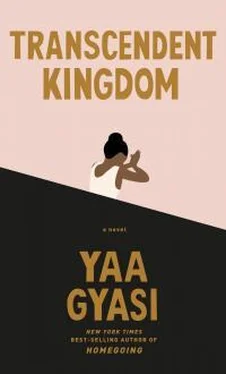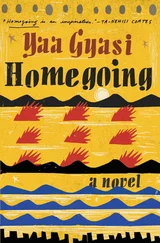Had I known she was coming, I would have adjusted my schedule so that I’d have something cool to show her, a surgery or a training session. Instead, I showed her the behavioral testing chamber, now empty, the tools in my lab, unused.
“Where are the mice?” she asked.
I pulled out Han’s because they were closest to me. They were sleeping in their box, eyes closed, curled up, cute.
“Can I hold one?”
“They can get kind of jumpy, so you have to be careful, okay?”
She nodded, and I caught one and handed it to her.
She held the mouse in both hands, brushed her thumb over its head, and one of its eyes opened, rolled back as if to find her, before closing again. My mother laughed and my heart leapt at the sound.
“Do you hurt them?”
I had never fully explained my work to my mother. Whenever I did tell her about it, I used only the most scientific, most technical of terms. I never used the words “addiction” or “relapse,” I said “reward seeking” and “restraint.” I didn’t want her to think about Nana, to think about pain.
“We try to be as humane as possible and we don’t use animals if we can do things another way. But sometimes we do cause them some discomfort.”
She nodded and carefully placed the mouse back in its box, and I wondered what she was thinking. The day my mother had come home to find me and Nana tending to the baby bird, she told us that it wouldn’t live because we had touched it. She took it up in her hands as the two of us begged her not to hurt it. Finally, she just shrugged and gave it back to us. In Twi, she said, “There is no living thing on God’s Earth that doesn’t come to know pain sometime.”
—
In the final stage of Mahler’s separation-individuation theory of child development, babies begin to become aware of their own selves, and in so doing start to understand their mothers as individuals. My mother walking around my lab, observing things, showing tenderness toward a mouse when she rarely showed tenderness toward any living creature, all while in the depths of her depression, deepened this lesson for me. Of course, my mother is her own person. Of course, she contains multitudes. She reacts in ways that surprise me, in part, simply because she isn’t me. I forget this and relearn it anew because it’s a lesson that doesn’t, that can’t, stick. I know her only as she is defined against me, in her role as my mother, so when I see her as herself, like when she gets catcalled on the street, there’s dissonance. When she wants for me things that I don’t want for myself—Christ, marriage, children—I am angry that she doesn’t understand me, doesn’t see me as my own, separate person, but that anger stems from the fact that I don’t see her that way either. I want her to know what I want the same way I know it, intimately, immediately. I want her to get well because I want her to get well, and isn’t that enough? My first thought, the year my brother died and my mother took to bed, was that I needed her to be mine again, a mother as I understood it. And when she didn’t get up, when she lay there day in and day out, wasting away, I was reminded that I didn’t know her, not wholly and completely. I would never know her.
46
And yet sometimes I would look at her and I would see it, that which is alive and shivering in all of us, in everything. She would hold a mouse, hold my hand or my gaze, and I would catch a glimpse of the very essence of her. Please don’t go, I thought when I drove her home from the lab and she got back into bed. Don’t leave me, not yet.
I took to working at the desk in the living room, leaving my bedroom door open so that I could hear her if she called for me. She never called for me, and I never worked. I had become a master at thinking about working without actually doing it. Here’s what I would write if I were writing my paper, I’d think, but then my wandering mind, that old prayer habit, would kick in and before long I’d be thinking about other things—the beach, mostly. I’d never really liked it, that activity of roasting oneself in the sun, turning on an invisible spit. I associated it with white people, and I was a poor swimmer besides.
But my mother’s people were from a beach town. I started writing my own fairy tale, wherein my mother, the beauty of Abandze, who grew sleepier and sleepier each year that she was away until finally she became unrousable, is carried on her golden bed by four gorgeous, strong men. She is carried all the way from my apartment in California to the coast of Ghana, where she is laid on the sand. And as the tide comes in, licking first the soles of her feet, then her ankles, to calf, then knee, she slowly starts to wake. By the time the water swallows the golden bed, stealing her out to sea, she has come alive again. The sea creatures take bits of her bed, and with it, they fashion a mermaid’s tail. They slip it onto her. They teach her how to swim with it. They live with her there forever. The Sleeping Beauty, the Mermaid of Abandze.
—
“Inscape,” the professor of my Gerard Manley Hopkins class once said, “is that ineffable thing that makes each person and object unique. It is the sanctity of a thing. As a Jesuit priest, Hopkins believed—”
“Do you think it’s possible to read Hopkins without bringing up his religion or his sexuality?” a classmate interrupted.
My professor shook her hair out of her face and trained her sharp eyes on him. “Do you?”
“I mean, the dude was so repressed by the church that he burned his poems. It’s bizarre to extol his religious ideals when they so clearly caused him great suffering.”
“Church doesn’t always have to be repressive,” another classmate said. “I mean, it was a nice way to learn about morals and how to be a responsible citizen and stuff. That’s really the only reason I would take my kids to church, so that they could learn about right and wrong.”
“Yeah, but it’s the way you learn about right and wrong that’s so messed up,” the first man said. “I felt so guilty all the time because no one ever actually sits you down and says, ‘This task, of being blameless in the eyes of God or whatever, is impossible. You will want to have sex, you will want to lie, you will want to cheat, even when you know it’s wrong,’ and just that desire to do something bad, for me, was crushing.”
Our professor nodded, the curtain of her blond hair that so often hid her eyes parting and closing in time with her movements. I looked at her and wondered if she’d ever heard it, that heart-knocking sound.
—
We know right from wrong because we learn it, one way or another, we learn it. Sometimes from our parents, who spend most of our early years teaching us how to survive, snatching our hands away from burners and electrical outlets, keeping us away from the bleach. Other times, we have to learn for ourselves, to touch our hands to the burner, to burn, before we know why there are things we can’t touch. These lessons that we learn by doing are pivotal to our development, but not everything can be learned that way.
Plenty of people drink without becoming alcoholics, but some people take a single sip and a switch trips and who knows why? The only guaranteed way to avoid addiction is to never try drugs. This sounds simple enough and the politicians and zealots who preach abstinence in all manner of things will have us believe that it is simple enough. Perhaps it would be simple if we weren’t human, the only animal in the known world that is willing to try something new, fun, pointless, dangerous, thrilling, stupid, even if we might die in the trying. The fact that I was doing addiction research at a university in the great state of California was the result of the thousands of pioneers who had climbed into their wagons facing disease and injury and starvation and the great, brutal expanse of land that ranged from mountain to river to valley, all for the sake of getting from one side of this enormous country to the other. They knew that there was risk involved, but the potential for triumph, for pleasure, for something just a little bit better, was enough to outweigh the cost. All you have to do is watch a child ride her bike directly into a brick wall or jump from the tallest branch of a sycamore tree to know that we humans are reckless with our bodies, reckless with our lives, for no other reason than that we want to know what would happen, what it might feel like to brush up against death, to run right up to the edge of our lives, which is, in some ways, to live fully.
Читать дальше












